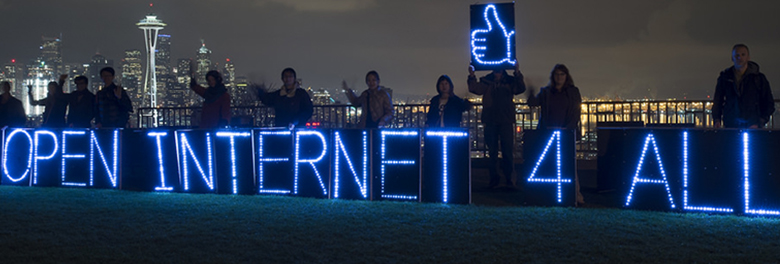On Nov. 21, the Federal Communications Commission (FCC) announced a plan to dismantle Obama-era regulations that ensure equal access to the Internet. This opens the door for Internet service providers (ISPs) to control the content we see, give more weight to big players, and monetize the Internet in a new way. Decision on the plan is expected Dec. 14.
Background
In 2015, President Obama’s FCC put in place the strongest-ever regulations to protect “net neutrality” – an even playing field for all online companies and websites to have equal access to their customers. Recognizing the essential role of the Internet, the FCC chose to regulate broadband service as a utility (like the telephone), not a business.
The 2015 regulations prevented ISPs from stopping or slowing down the delivery of web-sites or from offering special high-speed services for an extra fee. The new plan permits that.
- Telecom companies like AT&T and Verizon fought these regulations, saying the rules kept them from offering a wider selection of services, and that freedom from regulation helped the Internet thrive.
- Verizon has asked the FCC to preempt or void any state laws that (like the 2015 policy) regulate network neutrality and broadband privacy.
- Internet companies including Google, Netflix, and Amazon fought back in support of the 2015 rules, which they say kept the telecom companies from controlling Internet access.
- Trump’s FCC chair, Ajit Pai, and other critics have accused the 2015 Obama rules of “micromanaging the Internet” and intends to roll back the regulations. He argues that the repeal plan is sufficient now in simply requiring ISPs to be “transparent” about their practices
Why This Matters
- Instead of offering a government-backed guarantee of equal access, the Internet is likely to become a two-tier technology with a fast lane (big companies) and a slow lane (start-ups, small players such as Etsy and Pinterest, and everyone else).
- The repeal plan for the first time permits ISPs to block content.
- Consumers will most likely pay higher prices, reflecting the higher prices companies pay to ISPs for faster connections.
Effect on Internet Privacy
The 2015 rules prohibited an ISP from selling, sharing, or using our browsing history and app use unless we gave explicit affirmative permission. The new policy says ISPs do not need an affirmative opt-in consent. They must only offer us an opt-out, of which consumers rarely take advantage.

